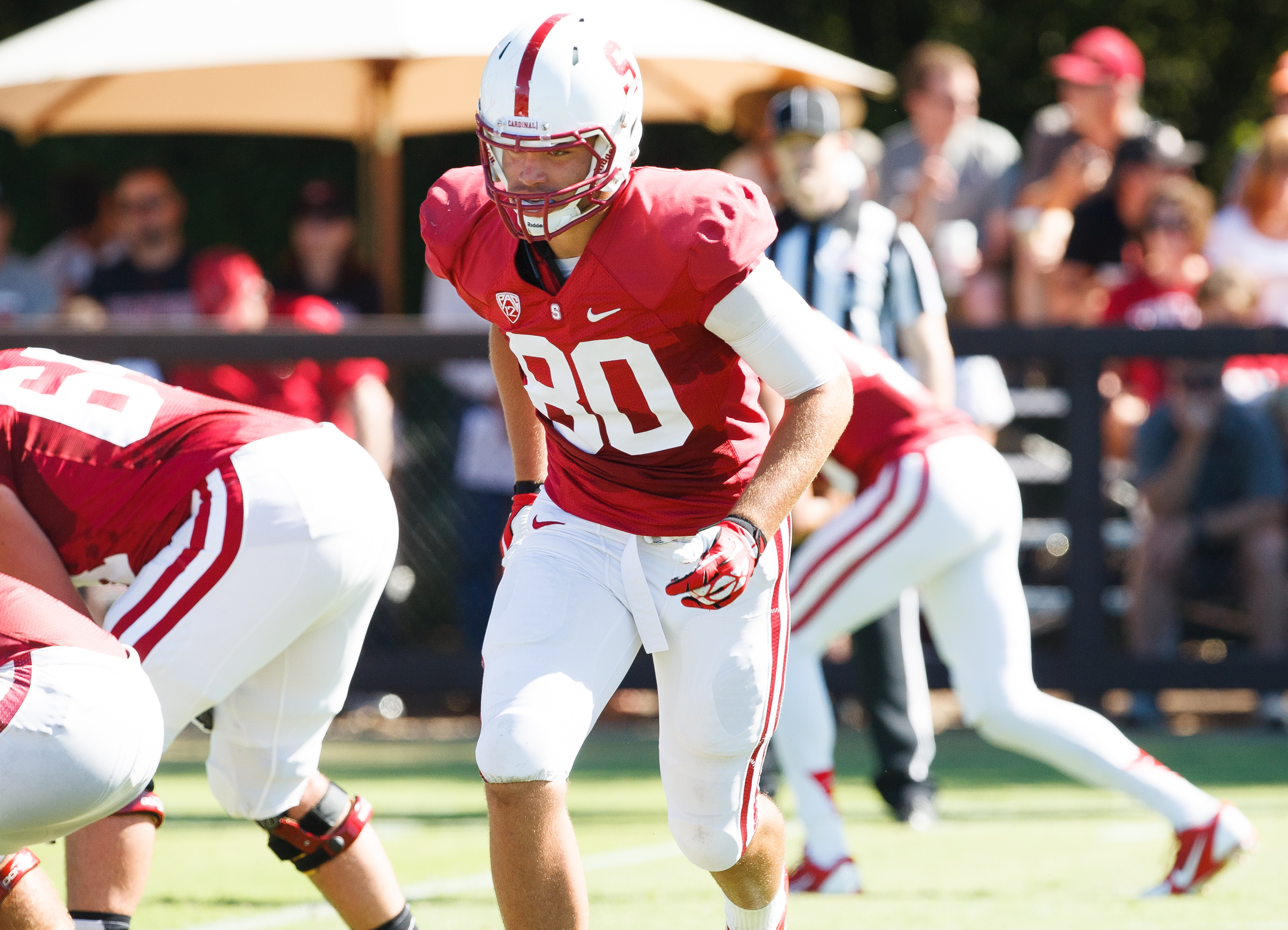Stanford’s reputation as Tight End U has grown to precede itself in recent years.
Four former Cardinal tight ends, two of whom were All-Americans, are now on NFL rosters. Jimmy Dray was deadly down the seam, Coby Fleener flung defenders away like rag dolls, Levine Toilolo was a nightmare to defend in the red zone and Zach Ertz had one of the greatest — and most important — catches in school history. Stanford embraced its reputation. During drives in 2012, the Cardinal sometimes used more tight ends than wide receivers, and only at Tight End U could a player be named to the John Mackey Award watch list without a single reception.

So when Stanford’s tight ends accounted for zero touchdowns last year, when tight end production plummeted from 93 receptions to just 10 and when the Cardinal couldn’t find a single reliable tight end despite starting with nine of them on the depth chart, Tight End U took a major blow.
While rediscovering the long ball, the Cardinal badly struggled in the intermediate passing game last season. Some of quarterback Kevin Hogan’s inconsistencies could be attributed to the lack of a tight end threat, specifically Ertz, in the middle of the field. Even the play-calling — only 2.2 percent of Stanford’s third-down plays in 2013 resulted in passes to a tight end — reflected the Cardinal’s new glaring weakness that just a year prior was their forte.
But for tight end coach Morgan Turner, maybe it was just about hitting the reset button.
Even as tight end production uncharacteristically suffered, a new trio of redshirt tight ends — Austin Hooper, Eric Cotton and Greg Taboada — was quietly developing to become the next Tree Amgios. They were talented, but they just weren’t ready to see the field as freshmen.
“The guys they [would’ve had to] go up against were defensive ends with four years of training in the weight room,” Turner said. “And [Hooper, Cotton and Taboada] were just coming out of high school.”
As is usually the case, the mental obstacle for most freshmen is the voluminous Stanford playbook, which is why, according to head coach David Shaw, it’s “unlikely” that a highly touted tight end, freshman Dalton Schultz, will get playing time this year.
“You can learn it on the whiteboard, but once you see it against a real defense that’s moving around, knowing your count and jumping around, that’s when it really takes some time to understand [the playbook],” Hooper said.
Shaw’s criteria in determining which tight ends will see playing time is similar to his standards for running backs. At Stanford, a tailback’s value is measured by his pass protection skills, not flashiness, and a tight end with good hands will also still sit on the bench if he can’t run-block at the line of scrimmage. It’s a rite of passage that Dray, Fleener, Ertz and Toilolo all went through before they could start making their memorable grabs.
“[Tight ends] have to be able to block,” Turner said. “They’re not receivers. They have to be able to block, or else we can’t find a place for them.”
Among the sophomore trio, the light came on the fastest for Hooper, who has earned himself a starting role at the Y tight end position. Shaw has been most impressed by Hooper’s ability to block at the line of scrimmage to the extent that he would feel comfortable leaving Hooper in for Stanford’s jumbo packages instead of replacing him with an offensive lineman.
“Hooper is not afraid to hit anybody,” Turner added. “He’s able and willing to drive people off the ball, and he’s been great in the passing game as well.”
Cotton and Tabaoda aren’t too far behind either, as both had impressive spring games.
As dominant as Fleener and Ertz became, their development took time. In fact, all four former Stanford tight ends who are now in the NFL had to wait patiently in the wings as redshirts.
“Coby Fleener took a while to get some traction. Levine Toilolo came in as a great run-blocker but had to develop his skills as a pass-catcher. Zach Ertz took a year to truly learn the position and be as versatile as we needed him to be,” Shaw said. “That group took a while for them to get to where they were. I think we’ll know about this [year’s] group faster because they all played earlier than the other group played.”
If the new trio can continue to stay ahead of the learning curve, Hogan may just have a new arsenal of weapons to work with this season — and Tight End U may just live up to its reputation once again.
Contact George Chen at ghen15 ‘at’ stanford.edu.
2014 Stanford Football Preview Series
[ubergrid id=1087349]
